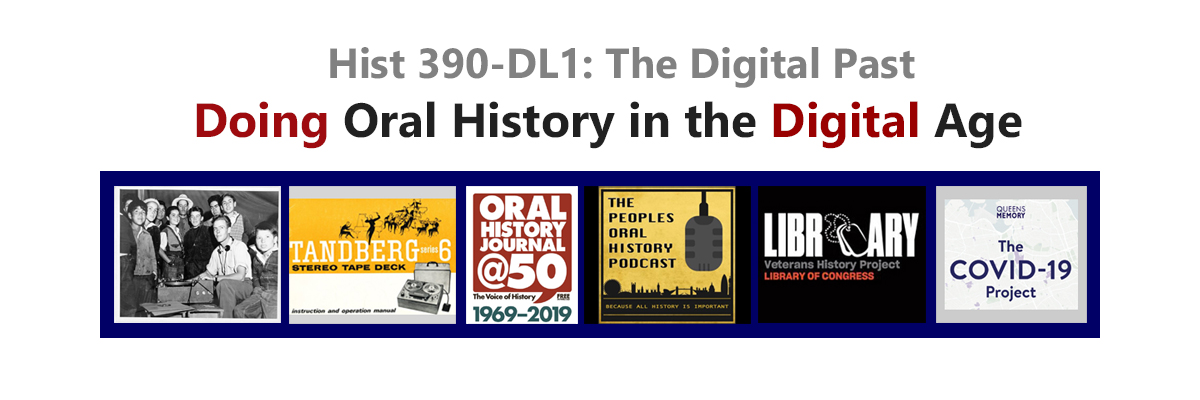Hist 390-DL1: The Digital Past: Doing Oral History in the Digital Age
Spring 2024
Time: Asynchronous
Location: Online
Instructor: Katharina Hering, PhD, MLIS
Office hours: Tuesdays 6:00-7:00 pm and by appointment (via Zoom)
Slack workspace:
Course description
In this course, you will learn how to do history using a wide variety of digital tools. This course — which fulfills the university’s Core IT requirement — will teach you the fundamentals of information technology through creative and critical engagement with historical methods and sources. You will engage with legal, ethical, and methodological questions about practicing history in the digital age. Oral history (as a practice and genre) has been particularly impacted by and transformed through digital technologies, and the specific focus of this course will be on using digital tools to analyze, prepare, present and preserve oral history online. Through learning by doing, you will gain and apply analytical and technical skills that will be useful for your university education and professional career.
The course will be taught virtually and asynchronously, meaning that we will follow a weekly schedule, and you may complete the coursework throughout the week at your own pace and time. This includes completing assignments and posting to our discussion board on Slack.
We’ll be accessible to you throughout the semester. I will schedule weekly open office hours via zoom and am available by appointment. Laura Crossley will also be available by appointment. While I also have a day job, this course and all of you are very important for me, and I will make time to talk with you.
Learning outcomes
In this course, you will:
* Learn about the history of field recording and the evolution of recording technologies, and about the dramatic impact the development of digital technologies continues to have on oral history.
* Learn how to discover and analyze primary and secondary sources online by reading metadata efficiently and understanding how search engines work.
* Produce an analytical historical presentation incorporating primary as well as secondary sources. The presentation can be a podcast, video-stories, or a multi-media exhibition.
* Learn the basics of audio editing and podcasting.
* Learn the basics of personal digital archiving, while developing a digital preservation plan for your digital coursework and personal files.
* Engage with legal and ethical questions relevant for the digital environment and apply them to your own work.
* Do digital history in and for the public.
Because it is an IT course, this course will also meet the following learning outcomes (general education IT requirement):
- Students will understand the principles of information storage, exchange, security, and privacy and be aware of related ethical issues.
- Students will become critical consumers of digital information; they will be capable of selecting and evaluating appropriate, relevant, and trustworthy sources of information.
- Students can use appropriate information and computing technologies to organize and analyze information and use it to guide decision-making.
- Students will be able to choose and apply appropriate algorithmic methods to solve a problem.
